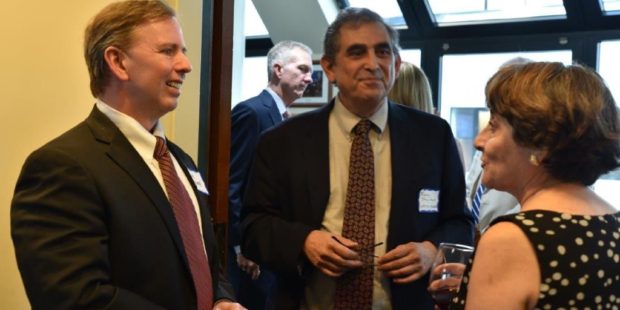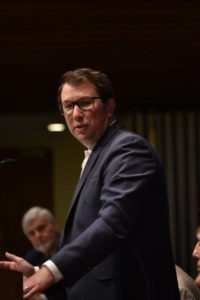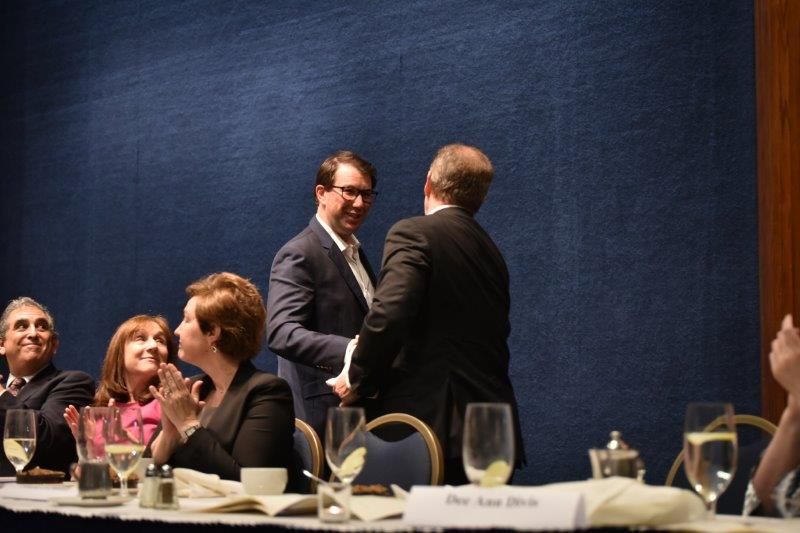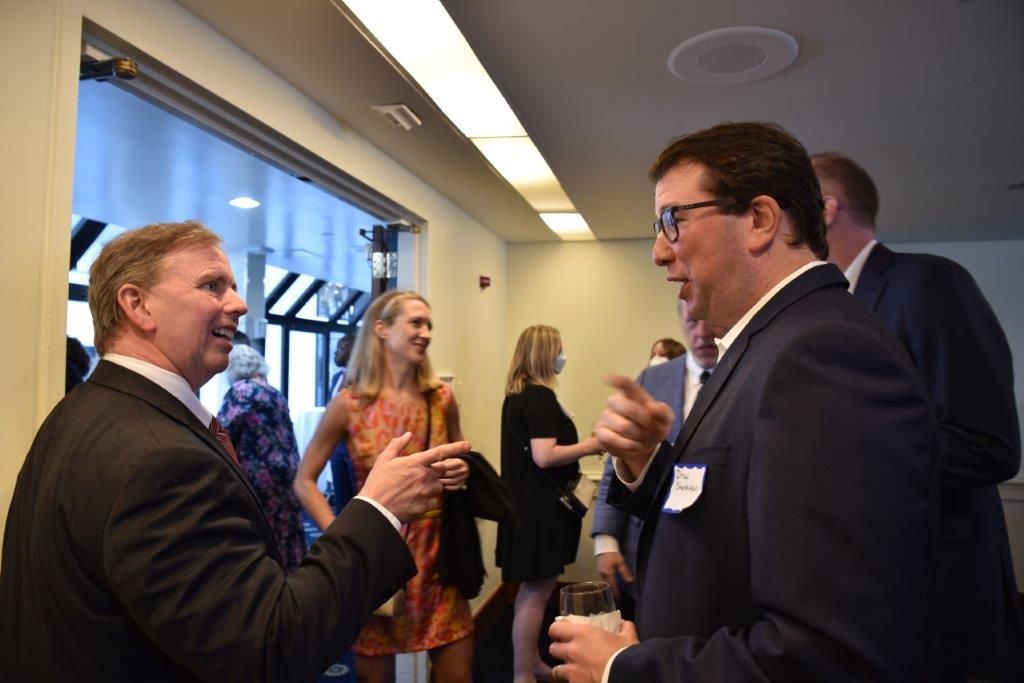
Frank LoMonte, left, is chatting with outgoing SPJ DC Pro Chapter President Randy Showstack and Julie Asher, co-chair of the Dateline Awards and Hall of Fame Dinner Committee for 2022 and a past chapter president. Photo: Louise Krafft
As part of the evening honoring journalists and journalism at the Washington, D.C., Pro Chapter of the Society of Professional Journalists’ annual Dateline Awards and Hall of Fame dinner June 14, 2022, in the ballroom of the National Press Club, Frank LoMonte was recognized as the 2022 recipient of the chapter’s Distinguished Service in Local Journalism Award.
As with the Hall of Fame inductees, the DSA awardee was introduced by a person he selected, then gave a speech himself about protecting a free press and preserving journalism in our democracy in general.
Frank LoMonte was executive director of the Student Press Law Center for nearly a decade, during which he responded personally to almost 1,000 requests for legal help from journalists and educators throughout the country, and taught educational workshops about the law in some 30 locations from coast to coast each year. He was the lead author of the SPLC’s reference book, “Law of the Student Press,” and his articles about media-law topics have been widely published in daily newspapers and legal journals.
Drew Shenkman introduces Frank LoMonte
(remarks as prepared for delivery, with some ad-libs, as remembered later, inserted by Shenkman)
Hello, I’m Drew Shenkman, associate general counsel with CNN, and am proud to introduce Frank LoMonte, recipient of the 2022 Distinguished Service Award recognizing his years as executive director of the Student Press Law Center based here in Washington.

Now before I introduce Frank, I want to ask a few questions for everyone here:
Raise your hand if you were ever a student journalist.
Raise your hand if you ever worked with or hired a young journalist fresh out of journalism school.
Seeing nearly every hand in the room go up, I think it’s safe to say that you have been impacted by Frank LoMonte.
Now Frank currently works with me at CNN, but that’s not how I know him, and not why he’s being honored tonight.
I met Frank in 2008 as a young law firm associate here in D.C., and Frank, as new director of the Student Press Law Center, was looking for pro bono counsel volunteers for student journalists.
Of course I immediately said yes, and what struck me then — and to this day strikes me about Frank — is his infectious passion for and knowledge of the First Amendment and access to public information, records, and government transparency [which, by the way, is why we got him to come work for CNN!].
Frank’s also a mini-celebrity. Everywhere I have ever been with Frank, including this morning at CNN’s D.C. bureau, a fan club suddenly emerges. A former student newspaper editor he helped here, a student who took his class over there, scores of journalists who are just media law nerds (a First Amendment lawyer’s favorite category!). Everyone loves Frank!
He even has his own Wikipedia page, and that’s not something you see a lot for lawyers.
But none of this is hardly surprising, because as director of the Student Press Law Center, Frank launched a number of major programming initiatives.
“New Voices” resulted in the enactment of stronger legal protections for student journalists in 13 states.
The “Active Voice” fellowship program provides opportunities for college students to design “press freedom service projects” amplifying the voices of young women, who experience the brunt of school censorship.
And he’s mentored countless student journalists, professional journalists and media lawyers over the years, including me.
Student journalism is the bedrock of ALL journalism. And Frank is the embodiment of it all.
In short, I can think of no one more deserving of this group’s Distinguished Service Award than Frank LoMonte, so please join me in welcoming Frank LoMonte!

LoMonte accepts Distinguished Service Award
As a lifelong sufferer of crippling social anxiety, I’d like to thank the SPJ for this truly terrifying award. … I got into journalism at a very early age because, as a deeply committed introvert with zero interpersonal skills, I was assured I could spend the rest of my life unobtrusively lingering at the darkened back of meeting rooms like this one, shabbily dressed, quietly mocking the self-important a**holes at the podium.
No, I’m sincerely grateful to the SPJ D.C. Pro Chapter for this incredibly kind recognition, which is doubly meaningful because it carries the word “service.” If there is one coherent theme that has connected up my otherwise incoherent professional life – all these positions I’ve been incapable of holding onto successfully – I hope it has been “service.”

Coming up from nothing, I never really envisioned or aspired to being wealthy or famous, but I did always know that whatever I did, it would be useful. My father, who was from Brooklyn and did two tours in the Army, had a lavishly appointed vocabulary of swear words – in English and Italian – but when he really wanted to curse someone, he’d call them “useless.” So I thank you for this recognition that people who aren’t tall or handsome or good with words, or really good at much of anything, can still be useful.
I was thinking as I wrote down these notes about how sad it is that my parents, Frank and Rosemarie, didn’t live to see tonight. But then I realized they’d already have fallen over dead yesterday as soon as I told them I got to use the urinal next to Wolf Blitzer.
Seriously, I am very appreciative and honored that my current legal colleague Steve Kiehl and my long-ago college newsroom colleague Chuck Tobin are both here tonight – and of course my boss Drew Shenkman, who has afforded me the incredible honor of helping serve America’s finest journalists on the front line of fragile democracies, both abroad and here at home. I particularly want to say that working under the inspirational leadership of Jeff Zucker was the most fulfilling 10 hours of my professional life. So many people tonight have come up and complimented me on the excellence of our programming at CNN that I’m very seriously thinking about splurging on cable.
Of all the honors I’ve been privileged to receive over a long and varied professional life, this is without a doubt the second most meaningful. For the most meaningful honor – well, let me take you back to January 2, 2008, the day I started work at the Student Press Law Center. It was a holiday, but I was so eager I showed up at the dark empty office to start unpacking, and the hotline phone rang. Well, I had no clue. But I’m in charge, I’m the only one around, so – we’ll figure it out. And on the other end was Henry Rome of the Conestoga, Pennsylvania, High School newspaper, The Spoke. And Henry had his teeth into a hell of a story, for a reporter who needed his mom to drive him to the courthouse, about a guy who’d been working as a janitor on-and-off at Conestoga – taking days off, totally unbeknownst to the school district, to finish out his halfway-house sentence after doing time for driving the getaway car in a string of bank robberies.
That story – “Obligation to Report” – helped change the law, and it won Henry the national high-school journalist-of-the-year award, and that helped him land the editor-in-chief position at the Daily Princetonian, and that got him hired as a correspondent with the Jerusalem Post, and that got him into the Kennedy School at Harvard – you see why this high school journalism stuff is so addictive, right? And one day our paths cross at a journalism convention, and Henry reveals that he and I spent so many hours back-and-forth on the phone vetting that story when he was a kid that his baby brother had named his stuffed toy lion “Frank.” So that was unquestionably the most meaningful honor of my professional career. But let’s call this a very close second.
One more person that I really do need to thank is someone very familiar to the people in this room, Kathryn Foxhall, who is the white-hot-burning ethical conscience of this wonderful organization. Kathryn is like what would happen if Marvel and Disney Plus decided to recast that She-Hulk series with a 65-year-old librarian in the lead role – 98 pounds of smoldering First Amendment rage. We hear a lot these days about the radicalizing effect of YouTube and 4chan and Reddit, but I can point to my moment of First Amendment radicalization right here in this room at the National Press Club, along with Kathryn and someone else who needs no introduction to you, Professor Carolyn Carlson, a former national president of SPJ.
About a dozen years ago, Carolyn had organized this panel, bringing together reporters who cover federal agencies with the public information officers who manage media relations for those federal agencies. And this very delightful gentleman who handled press for the Department of Agriculture was very matter-of-factly telling us how nobody got an interview with any of the managers at USDA until he first did a sitdown with them to furnish them with talking points, to make sure all of the management of the USDA conveyed the public impression of being on the same page with the same priorities. And all I could think of was: If the senior management of a $150 billion federal agency is not really on the same page, not working on the same priorities – that’s news, right? That’s something the public needs to hear, and we never will hear it, as long as we tolerate the unlawful and civically indefensible silencing of our public employees, in the name of promoting a deceptively favorable image of the government.
When the government of Russia or China tells people that it’s a punishable offense to criticize the government, we recognize that as propaganda. We call it by its name. But in our country, where public relations professionals now outnumber paid professional journalists six-to-one, we just call it, quote-unquote, “protecting the brand.”
Let’s be clear: The reason we have a First Amendment – the only reason we have the First Amendment – is so people can make the government look bad. That’s not a bug, it’s a feature. It’s why we threw the tea in the harbor. If you don’t get that, you don’t get America.
We have to fix this. We have to challenge – head-on – the idea that it is a legitimate use of government power and government money to paper over the defects and dysfunction in government so the public will believe the government works better than it really does. That obsession with cultivating a favorable reputation – of celebrities, of industries, of government – is deeply ingrained in our modern society, and it may seem impossibly hard to challenge. But let me tell you what I told everyone I hired at the Student Press Law Center. You cannot go to court and ask a bunch of 79-year-old federal judges to respect the rights of kids with newspapers unless you are an optimist. You cannot successfully work for the SPLC unless you start each day with the certainty that, if you ram your head very very hard into a brick wall enough times, it is the wall that will break. So, yes, fixing the gagging of America’s public employees will be hard – and that’s why need to get started right away. And it starts with believing.
News organizations have been fighting from our heels for a very, very long time now: “Oh, the legislature only passed five new exemptions to the public records act – that means we had a good year.” Well, we don’t have any more real estate to give up. Democracy cannot keep ceding more and more territory each year to authoritarianism. When we see that in other countries, we call it what it is. We call it appeasement. And it’s about time we called it out here at home – while we still can.
I hope in these past few minutes maybe I’ve amused you and maybe I’ve entertained you. But I really hope that I’ve enraged you. Because mad people get shit done.
So, drink up, tip your servers, get a good night’s sleep – and wake up charging. Changing the culture seems audacious, for sure, but I have seen too many walls come down to stop believing now. I know to a certainty that the wall will come down. But I also know that it will not come down all by itself.

